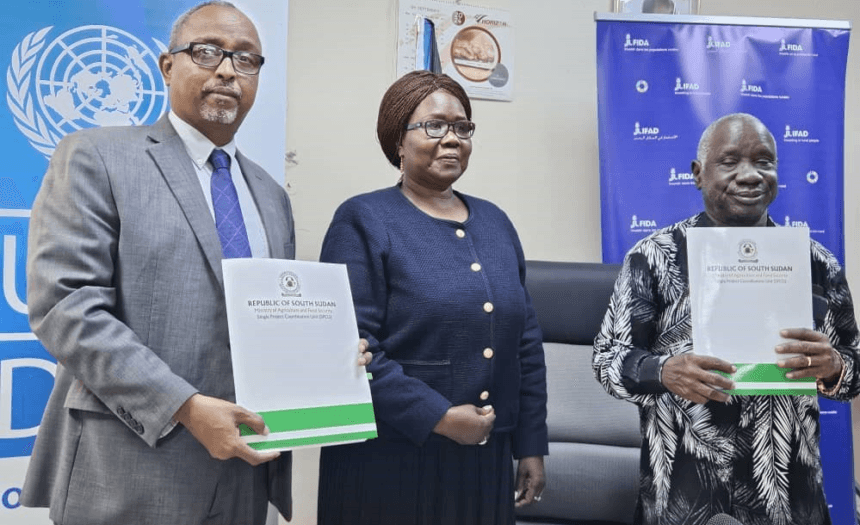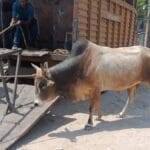Main Points In Hindi (मुख्य बातें – हिंदी में)
-
फंड का उद्देश्य: इस फंड का मुख्य लक्ष्य दक्षिण सूडान में खाद्य सुरक्षा में सुधार करना, आय के स्तर में वृद्धि करना और कृषि क्षेत्र में आर्थिक और पर्यावरणीय झटकों के खिलाफ लचीलापन बढ़ाना है।
-
सहयोग और अनुदान: संयुक्त राष्ट्र विकास कार्यक्रम (यूएनडीपी) और कृषि और खाद्य सुरक्षा मंत्रालय ने कृषि विकास के लिए ग्रामीण उद्यम (रीड) कार्यक्रम के तहत 16.8 मिलियन अमेरिकी डॉलर का अनुदान प्राप्त किया है, जो आईएफएडी और जीएएफएसपी द्वारा समर्थित है।
-
कृषि में विकास: रीड कार्यक्रम का मुख्य उद्देश्य ग्रामीण उत्पादक संगठनों और सहकारी समितियों को सशक्त बनाकर टिकाऊ और लचीली कृषि मूल्य श्रृंखलाएं विकसित करना है, जिससे उत्पादन क्षमता बढ़ाना और ग्रामीण उद्यम विकास को बढ़ावा देना शामिल है।
-
लक्ष्य क्षेत्र: यह कार्यक्रम दक्षिण सूडान के पांच राज्यों में लगभग 162,315 घरों को लक्षित करेगा, जिसमें जलवायु-लचीली कृषि पद्धतियों के माध्यम से खाद्य सुरक्षा में सुधार करना और ग्रामीण आय बढ़ाना है।
- कृषि क्षमता: दक्षिण सूडान की कृषि क्षमता विशाल है, लेकिन इसके बावजूद देश में खाद्य सुरक्षा की गंभीर स्थिति बनी हुई है, जहां 95% जनसंख्या कृषि पर निर्भर करती है, और राष्ट्रपति ने कृषि के आधुनिकीकरण का संकल्प लिया है।
Main Points In English(मुख्य बातें – अंग्रेज़ी में)
Here are the main points from the provided text:
-
Program Objectives: The initiative aims to transform the agricultural sector in South Sudan by improving food security, increasing income levels, and enhancing resilience against economic and environmental shocks.
-
Funding and Support: A grant of 16.8 million USD has been signed between the United Nations Development Program (UNDP) and the Ministry of Agriculture and Food Security to launch the Rural Enterprise for Agricultural Development (READ) program, supported by the International Fund for Agricultural Development (IFAD) and the Global Agriculture and Food Security Program (GAFSP).
-
Empowerment of Rural Organizations: The READ program is designed to empower rural producer organizations, agricultural producer groups, cooperatives, and micro and small enterprises, enabling them to become key players in sustainable and resilient agricultural value chains.
-
Target Areas and Impact: The program will be implemented in five states of South Sudan, targeting approximately 162,315 households within seven key agricultural value chains, with the ultimate goal of improving food security and promoting climate-resilient agricultural practices.
- Potential for Agricultural Development: South Sudan possesses significant untapped agricultural potential, with over 70% of its land suitable for crop production. However, the country faces severe humanitarian and food security challenges, with 95% of its population dependent on agriculture, fishing, or livestock for their food and income needs.


Complete News In Hindi(पूरी खबर – हिंदी में)
इस फंड का लक्ष्य खाद्य सुरक्षा में सुधार, आय के स्तर में वृद्धि और आर्थिक और पर्यावरणीय झटकों के खिलाफ लचीलापन बढ़ाकर देश में कृषि क्षेत्र में बदलाव लाना है।
इमैनुएल मंडेला द्वारा
संयुक्त राष्ट्र विकास कार्यक्रम (यूएनडीपी) और कृषि और खाद्य सुरक्षा मंत्रालय ने कृषि विकास के लिए ग्रामीण उद्यम (रीड) कार्यक्रम शुरू करने के लिए 16.8 मिलियन अमेरिकी डॉलर के अनुदान पर हस्ताक्षर किए हैं।
इंटरनेशनल फंड फॉर एग्रीकल्चरल डेवलपमेंट (आईएफएडी) और ग्लोबल एग्रीकल्चर एंड फूड सिक्योरिटी प्रोग्राम (जीएएफएसपी) द्वारा समर्थित इस पहल का उद्देश्य खाद्य सुरक्षा में सुधार, आय के स्तर में वृद्धि और आर्थिक के खिलाफ लचीलापन बढ़ाकर दक्षिण सूडान में कृषि क्षेत्र को बदलना है। पर्यावरणीय झटके.
रीड कार्यक्रम ग्रामीण उत्पादक संगठनों (आरपीओ), कृषि उत्पादक समूहों (एपीजी), सहकारी समितियों और सूक्ष्म और लघु उद्यमों (एमएसई) को सशक्त बनाने के लिए तैयार किया गया है, जिससे वे टिकाऊ और लचीली कृषि मूल्य श्रृंखला में प्रमुख खिलाड़ी बन सकें। यह पहल उत्पादन क्षमता बढ़ाने, बाजारों और वित्तीय सेवाओं तक पहुंच को सुविधाजनक बनाने और ग्रामीण उद्यम विकास का समर्थन करने वाले नीति ढांचे को मजबूत करने पर भी ध्यान केंद्रित करेगी।
पहल के प्रभाव पर बोलते हुए, यूएनडीपी के एक प्रतिनिधि ने कहा, “हमारी प्रतिबद्धता लचीले ग्रामीण उद्यमों का निर्माण करना है जो न केवल खाद्य प्रणालियों को मजबूत करते हैं बल्कि समुदायों का उत्थान भी करते हैं, यह सुनिश्चित करते हुए कि घर आर्थिक और पर्यावरणीय दोनों चुनौतियों का सामना कर सकें।”
यह कार्यक्रम पांच राज्यों- सेंट्रल इक्वेटोरिया, जोंगलेई, अपर नाइल, वेस्टर्न इक्वेटोरिया और पूर्वी इक्वेटोरिया में शुरू किया जाएगा, जिसमें सात प्रमुख कृषि मूल्य श्रृंखलाओं में लगभग 162,315 घरों को लक्षित किया जाएगा। अंतिम लक्ष्य खाद्य सुरक्षा में सुधार करना, ग्रामीण आय में वृद्धि करना और जलवायु-लचीली कृषि पद्धतियों के माध्यम से पर्यावरणीय स्थिरता को बढ़ावा देना है।
इस बहु-मिलियन डॉलर की साझेदारी के साथ, दक्षिण सूडान के ग्रामीण समुदाय परिवर्तनकारी विकास के लिए तैयार हैं, जिससे देश की कृषि रीढ़ को मजबूत करने और दीर्घकालिक आर्थिक स्थिरता में योगदान करने में मदद मिलेगी।
विशेष रूप से, दक्षिण सूडान में विशाल लेकिन अप्राप्त कृषि क्षमता है, अनुकूल मिट्टी, पानी और जलवायु परिस्थितियों के कारण इसके कुल भूमि क्षेत्र का 70 प्रतिशत से अधिक हिस्सा फसल उत्पादन के लिए उपयुक्त है।
संयुक्त राष्ट्र खाद्य और कृषि संगठन की एक रिपोर्ट के अनुसार, देश की 95 प्रतिशत आबादी अपनी भोजन और आय की जरूरतों को पूरा करने के लिए खेती, मछली पकड़ने या पशुपालन पर निर्भर करती है। फिर भी, दक्षिण सूडान दुनिया की सबसे खराब मानवीय और खाद्य सुरक्षा स्थितियों में से एक का सामना कर रहा है।
अर्थव्यवस्था पर कृषि क्षेत्र के संभावित प्रभाव को समझते हुए, राष्ट्रपति साल्वा कीर ने बीजिंग में चीन-अफ्रीका सहयोग मंच (एफओसीएसी) के 9वें शिखर सम्मेलन के मौके पर राज्य शासन पर उच्च स्तरीय बैठक में अपने संबोधन में कहा, देश में खाद्य उत्पादन बढ़ाने के लिए कृषि को आधुनिक बनाने का वादा किया।
राज्य प्रमुख ने कहा कि देश की प्राथमिकताओं में खाद्य उत्पादन बढ़ाने और व्यापार को बढ़ावा देने के लिए आधुनिक प्रौद्योगिकियों को अपनाने के माध्यम से कृषि का आधुनिकीकरण शामिल है। इसके अलावा, उन्होंने कृषि क्षेत्र के आधुनिकीकरण की प्रक्रिया के प्रबंधन के लिए दक्षिण सूडानी की तकनीकी क्षमता को मजबूत करने का आह्वान किया।
रीड एक कार्यक्रम है जो दक्षिण सूडान के कृषि क्षेत्र को बदलने और ग्रामीण घरों और क्षेत्रों की क्षमता का निर्माण करके देश की खाद्य सुरक्षा को बढ़ावा देने के लिए तैयार है – जो इस क्षेत्र में मानव पूंजी के प्राथमिक जीवनदाता योगदानकर्ता हैं।
कार्यक्रम न केवल आरपीओ को मजबूत करने, प्रशिक्षण और क्षमता निर्माण पहल प्रदान करने, ग्रामीण वित्तीय सेवाओं तक पहुंच की सुविधा प्रदान करने और ग्रामीण उद्यमों का समर्थन करने वाली नीति और नियामक ढांचे के कार्यान्वयन में मदद करने की सुविधा प्रदान करेगा, बल्कि यह अंततः यह सुनिश्चित करेगा कि आरपीओ और उनके सदस्य अन्य पहलों के अलावा, उत्पादन और उत्पादकता में वृद्धि, बाजारों और वित्तीय सेवाओं तक पहुंच और ग्रामीण उद्यम विकास का समर्थन करने वाली नीति और संस्थागत ढांचे को मजबूत करना।
Complete News In English(पूरी खबर – अंग्रेज़ी में)
This fund aims to transform the agricultural sector in the country by improving food security, increasing income levels, and enhancing resilience against economic and environmental shocks.
By Emmanuel Mandela
The United Nations Development Program (UNDP) and the Ministry of Agriculture and Food Security have signed an agreement for a grant of $16.8 million to launch the Rural Enterprise for Agricultural Development (READ) program.
Supported by the International Fund for Agricultural Development (IFAD) and the Global Agriculture and Food Security Program (GAFSP), this initiative aims to improve food security and increase income levels while enhancing resilience against economic and environmental shocks in South Sudan’s agricultural sector.
The READ program is designed to empower Rural Productive Organizations (RPOs), Agricultural Producer Groups (APGs), cooperatives, and micro and small enterprises (MSEs) to become key players in sustainable and resilient agricultural value chains. The initiative will also focus on increasing production capacity, facilitating access to markets and financial services, and strengthening policy frameworks that support rural enterprise development.
Speaking about the impact of the initiative, a UNDP representative stated, “Our commitment is to build resilient rural enterprises that not only strengthen food systems but also uplift communities, ensuring that households can face both economic and environmental challenges.”
This program will be launched in five states—Central Equatoria, Jonglei, Upper Nile, Western Equatoria, and Eastern Equatoria—targeting around 162,315 households across seven key agricultural value chains. The ultimate goal is to improve food security, increase rural income, and promote environmental sustainability through climate-resilient agricultural practices.
With this multi-million dollar partnership, rural communities in South Sudan are poised for transformative development, which will help strengthen the agricultural backbone of the country and contribute to long-term economic stability.
Notably, South Sudan has vast but untapped agricultural potential, with over 70% of its total land area suitable for crop production due to favorable soil, water, and climate conditions.
According to a report by the United Nations Food and Agriculture Organization, 95% of the country’s population relies on farming, fishing, or livestock to meet their food and income needs. Nonetheless, South Sudan faces some of the worst humanitarian and food security situations in the world.
Understanding the potential impact of the agricultural sector on the economy, President Salva Kiir, during his address at the high-level meeting on state governance at the 9th Forum on China-Africa Cooperation (FOCAC) summit in Beijing, promised to modernize agriculture to increase food production in the country.
The President stated that modernizing agriculture involves adopting modern technologies to enhance food production and boost trade. Additionally, he called for strengthening South Sudan’s technical capacity to manage the modernization process in the agricultural sector.
READ is a program designed to enhance food security in South Sudan by transforming the agricultural sector and building the capacities of rural households and communities, which are major contributors to human capital in the region.
The program will not only strengthen RPOs and provide training and capacity-building initiatives but also facilitate access to rural financial services and support the implementation of policies and regulatory frameworks that assist rural enterprises. Ultimately, it will ensure that RPOs and their members enhance production and productivity, improve access to markets and financial services, and strengthen the policy and institutional framework supporting rural enterprise development.








